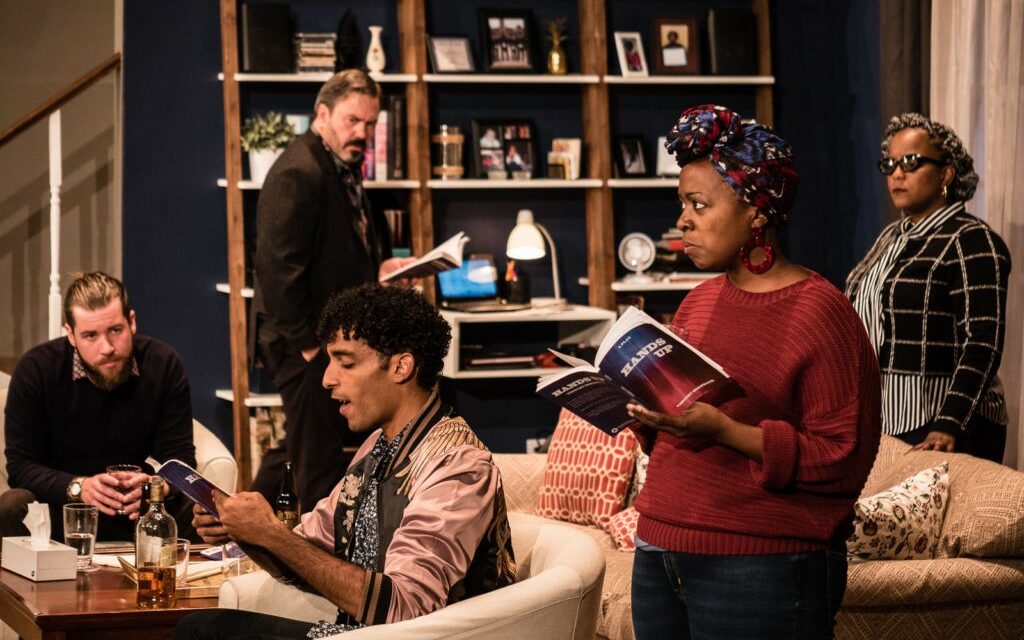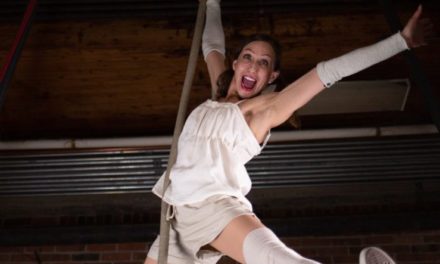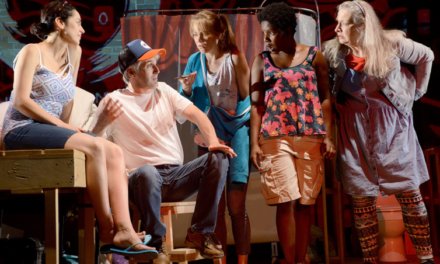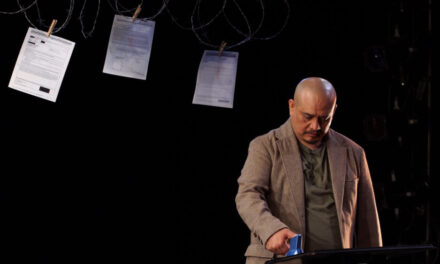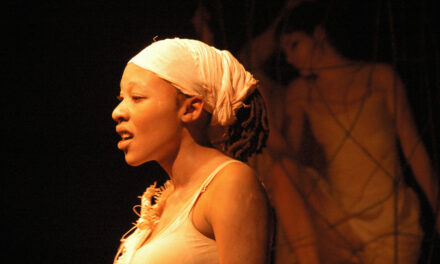You think you have a handle on the messy business of appropriation? Then you haven’t seen Kat Sandler’s quick-witted Bang Bang, now at the Great Canadian Theatre Company in a solid homegrown production.
Consider this: Sandler, a white playwright with a taste for nuance, has written a play in which an obtuse white playwright with a taste for social justice has written a play inspired by a real-life (well, real-life within Sandler’s play) shooting of a young black man by a black female police officer.
Not only has the clueless writer Tim (Phillip Merriman, making a welcome debut at GCTC) parachuted himself into a world he doesn’t understand and appropriated the voice of that female cop, he’s changed some facts in the story, turning the female into a male officer and killing off the shooting victim instead of merely wounding him.
What’s more, the play is about to become a film, which will potentially increase to a staggering degree public misinformation about what actually happened in the original shooting. Tim is OK with all this because, as a “woke” artist, he is out to raise awareness about critical social matters.
Do you feel your grip on the concept of appropriation – let alone issues like the dividing line between reality and fantasy and the responsibilities and limits of art in telling stories – starting to loosen?
Sandler, and the cast of Bang Bang, delight in upending our preconceptions about such timely matters. They do that, of course, in service of exploring gradation and viewing issues from multiple perspectives, an approach to complexity that’s in scant supply in our own current public discourse.
Back to the plot.
Tim shows up at the door of Lila (Cassandre Mentor), the black officer. Unemployed and emotionally adrift in the two years since the shooting, she’s been living with her psychologist mother Karen (Lucinda Davis, giving a succinct portrait of someone tamping down her motherly instincts as she hands full rein to her obsessive need for control, all the while fully aware of what she’s doing).
Tim, who has achieved wild success with his play, is there to tell Lila the story is about to be filmed. She does not react well to the impending return of the public spotlight nor to the appropriation of her voice.
Into this fraught scenario step Jackie (Michael Ayres) and Tony (Eric Coates). The former is an erstwhile child pop star eager to break with his past career by playing the black cop in the film. The latter is Jackie’s bodyguard, an ex-cop fond of opening his mouth before engaging his brain. Coates does a fine job of not only endearing us to his rough-hewn character but, late in the play, after some tasty chunks of meta-theatre, coaxing out a deeper, thoughtful side of Tony we never saw coming.
Racism, violence, family relationships, the fact that, without being in her shoes, we can never fully understand the dilemma of a cop confronting what she thinks is a life-threatening situation: It’s all part of what Sandler digs into as these five characters confront each other, themselves and the impossibly tangled issue of who has the right to speak for others and where art, and particularly theatre, stands in all this.
Despite a brief sag in the home stretch, director Bronwyn Steinberg keeps the show ticking over, maximizing bursts of David Mamet-like dialogue to move the story forward and then slowing the pace so we, and the characters, can catch our collective breath.
The frequent, very funny bits are played with knife-edge timing to puncture the characters’ self-regard (“I’m holding a mirror up to nature, and the mirror is dirty,” says Tim) while helping heighten the play’s serious intent.
Sandler’s multiple dynamics — humorous/serious, black/white, clueless/insightful — also play into designer Jennifer Goodman’s detailed, naturalistic set of Karen’s living room, where the entire play takes place. Tidy and very real, it stands in sharp contrast to the shape-shifting facts that underpin Tim’s script and the uncharted territory of representing others’ stories that Sandler’s characters stumble into.
And if you hope that Sandler will tie this all up in a neat bow at the end, well, you didn’t really think that would happen, did you?
Bang Bang is a Great Canadian Theatre Company production ran until Nov. 10, 2019.
This article was originally posted at capitalcriticscircle.com and has been reposted with permission. To read the original article, click here.
This post was written by the author in their personal capacity.The opinions expressed in this article are the author’s own and do not reflect the view of The Theatre Times, their staff or collaborators.
This post was written by Patrick Langston.
The views expressed here belong to the author and do not necessarily reflect our views and opinions.

